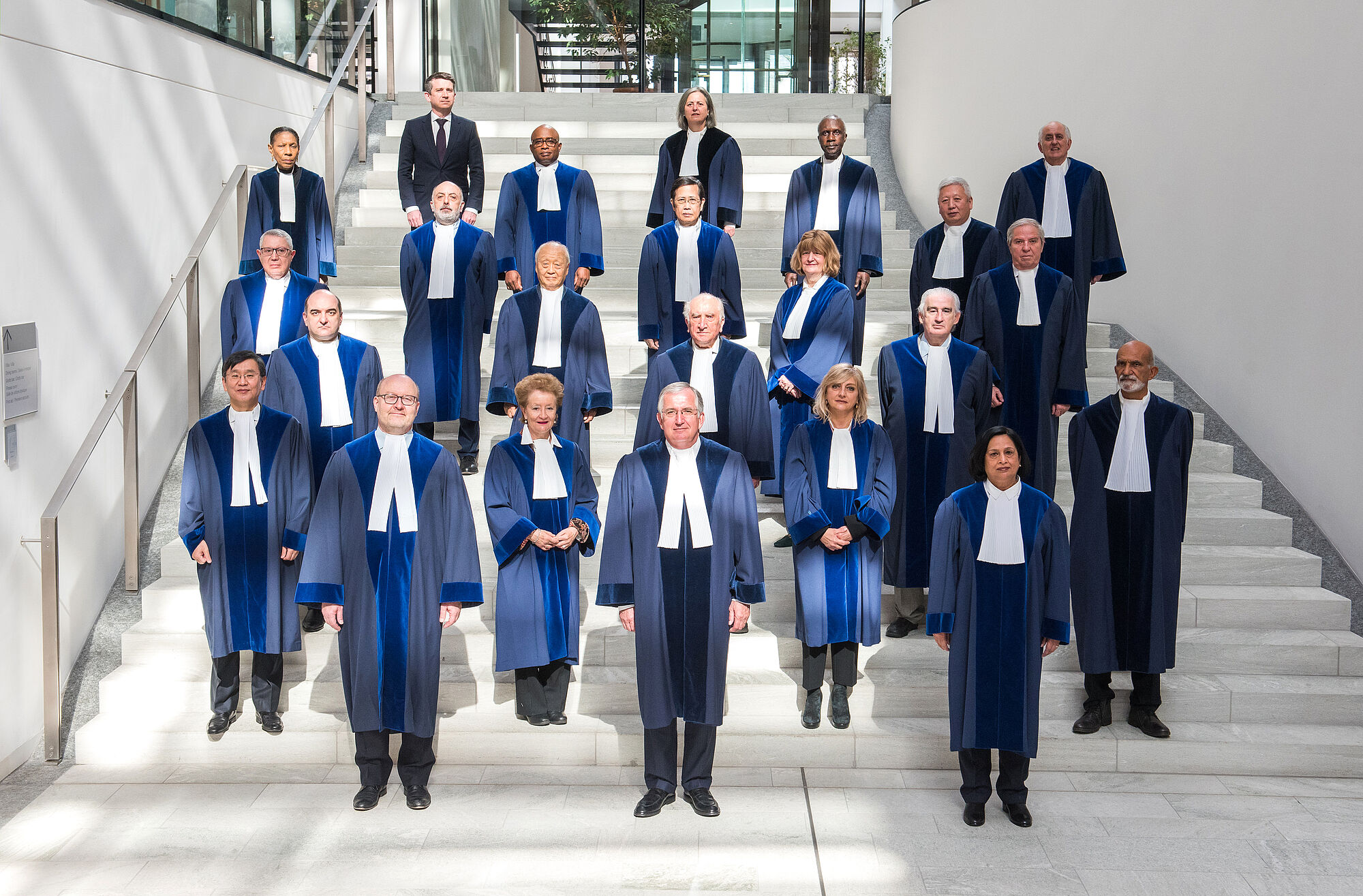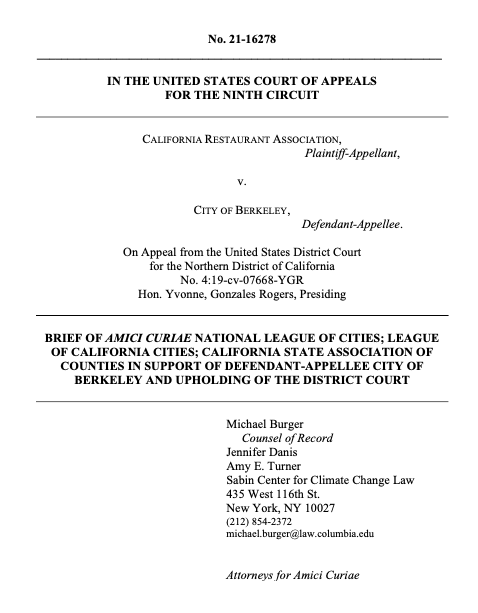
On December 12, 2022, the Commission of Small Island States on Climate Change and International Law (COSIS) requested the International Tribunal for the Law of the Sea (ITLOS) issue an advisory opinion on the State Parties’ obligations under the United Nations Convention on the Law of the Sea (UNCLOS) to prevent, reduce, and control pollution of the marine environment from climate change, and to protect and preserve the marine environment in relation to climate change impacts. The context and the facts behind this request are simple.
The interplay between the ocean and climate change is in the scientific literature, including recent reports from the Intergovernmental Panel on Climate Change (IPCC). The ocean is both a ‘victim’ of climate change (e.g., absorption of GHG by the oceans is the upstream cause of ocean acidification) and ‘part of the solution’ (e.g., if it can be used for the purpose of carbon storage) to it simultaneously. Having in mind this link between the oceans and climate change, it would be natural for the United Nations Conventions on the Law of the Sea (UNCLOS) to provide a clear picture of States’ obligations to protect and preserve the marine environment in the context of greenhouse gas (GHG) emissions and climate change.
However, the UNCLOS was adopted in 1982, one decade before the UNFCCC. Unsurprisingly, it does not mention GHG emissions, global warming, climate change, sea level rise, or ocean acidification. But silence, of course, does not mean that climate-related obligations cannot be fleshed out under Part XII of the UNCLOS (Protection and Preservation of the Marine Environment) or as a result of cross-regime interaction (Article 311 UNCLOS).
The ITLOS advisory opinion request brings, along with other advisory opinion requests to the International Court of Justice and the Inter-American Court of Human Rights, an innovative opportunity for an international court to flesh out States’ obligations to mitigate and adapt to climate change. However, some obstacles may lie ahead. The lack of advisory jurisdiction is the main procedural obstacle that may prevent the ITLOS from rendering an opinion. This blog post discusses some of these challenges.
Why an advisory opinion?
International courts and tribunals often have both contentious and advisory jurisdiction. In the case of the advisory jurisdiction, courts and tribunals are not asked to settle a dispute between the parties, but rather to provide their views on a specific matter relating to the interpretation of a norm of international law. In this way, then, advisory opinions contribute to the judicial development of international law. In that sense, the institutional reputation of the international court or tribunal rendering an advisory opinion explains the weight that opinion carries regardless of its lack of binding effect. Cases make law, but compared with binding judgments, advisory opinions have a greater potential to define States’ obligations under international law.
Unlike in the case of binding decisions, where the reasoning of the court or tribunal is analytically connected with the intricate facts of the dispute, advisory opinions are an authoritative, facts-detached, urbi et orbi interpretation of international law. Accordingly, unless there are compelling reasons to detach from that interpretation, the interpretation adopted in that opinion will likely guide the court or tribunal in future cases.
The Advisory Competence of the ITLOS
The UNCLOS established an institutional apparatus to preserve its integrity and secure its uniform interpretation and enforcement. To this end, the UNCLOS created the ITLOS and established a unique and intricate system of dispute settlement, which includes the concurrent contentious jurisdiction of the ITLOS, the ICJ, the arbitral tribunal, or the special arbitral tribunal — having in mind that States can freely choose which forum they prefer to use to settle their disputes (and being the default jurisdiction provided to the arbitral tribunal, according to Article 287 (3) and (5) of the UNCLOS).
Furthermore, it created the Seabed Disputes Chamber (SDC) — a special chamber of the ITLOS whose jurisdiction ratione materiae is limited to Part XI of the UNCLOS (The Area) and which holds the exclusive jurisdiction with regards to the interpretation and application of the legal regime of the Area (i.e. the rules applicable to the exploration and exploitation of minerals from the seabed, ocean floor, and subsoil thereof beyond national spatial jurisdiction) (Article 187 of the UNCLOS). However, although the UNCLOS explicitly mentions the contentious and advisory competence of the SDC (Article 191 of the UNCLOS), one of its provisions refers to the advisory competence of the other bodies. This could mean that the ITLOS lacks advisory competence in general.
Yet, the COSIS requested an advisory opinion from the ITLOS — not the SDC. The requested opinion refers to State Parties’ obligations under the UNCLOS to prevent, reduce, and control pollution of the marine environment from climate change and to protect and preserve the marine environment in relation to climate change impacts — not to any matter related to the legal regime of the Area. Therefore, one must ask whether the ITLOS holds advisory competence to render the advisory opinion requested by the COSIS.
This same issue was already raised in the Request for an Advisory Opinion Submitted by the Sub-Regional Fisheries Commission (SRFC) (Advisory Opinion, April 2, 2015, ITLOS Rep 4). In that case, 23 States, including the United States and the European Union, submitted their written statements and argued that the UNCLOS neither confers an advisory competence to the ITLOS, nor the authority to grant upon itself that advisory competence (ult. loc. cit., §§ 40-41). In their view, if the drafters of the UNCLOS had that advisory competence in mind, they would have explicitly referred to it. Absent explicit reference to ITLOS’ advisory jurisdiction in the UNCLOS, those States concluded that the ITLOS lacks the authority to render advisory opinions, except those delivered by its SDC under Art. 191 UNCLOS.
Nonetheless, the ITLOS rejected these arguments, noting Art. 21 of the ITLOS Statute. That article states that ‘[t]he jurisdiction of the [ITLOS] comprises all disputes and all applications submitted in accordance with [the UNCLOS] and all matters specifically provided for in any other agreement which confers jurisdiction on the [ITLOS]’ (emphasis added). This wording shows, according to ITLOS, that any matter, contentious or advisory (SRFC, §§ 56 and 58), may be conferred to the ITLOS by an ad hoc treaty related to UNCLOS’ purposes. Art. 138(1) of the Rules of the ITLOS — which only aims to ‘[furnish] the prerequisites that need to be satisfied before the [ITLOS] can exercise its advisory jurisdiction (ult. loc. cit., § 59) — states that ‘[t]he [ITLOS] may give an advisory opinion on a legal question if an international agreement related to the purposes of the [UNCLOS] specifically provides for the submission to the [ITLOS] of a request for such an opinion.’ As a result, although the UNCLOS is silent on ITLOS’ advisory jurisdiction, ad hoc treaties related to UNCLOS’ purposes can confer advisory competence to the ITLOS under Article 21 Statute of the ITLOS.
In that context, on October 31, 2021, the Government of Antigua and Barbuda and the Government of Tuvalu signed the Agreement for the Establishment of the Commission of Small Island States on Climate Change and International Law (COSIS Agreement, to which other States have acceded). Accordingly, COSIS’ only purpose is to request an advisory opinion to the ITLOS, ‘consistent with Article 21 of the ITLOS Statute and Article 138 of its Rules’ (Art. 2 (2) COSIS Agreement). This means that the COSIS Agreement is an ad hoc law of the sea treaty which does not provide for any right or obligation among the States parties regarding maritime activities — it authorizes the COSIS to request an advisory opinion to the ITLOS.
Can the ITLOS Render the Advisory Opinion requested by the COSIS?
Since no strong objections were raised after the rendering of the SRFC advisory opinion, it is unlikely that any State will challenge the advisory competence of the ITLOS if an ad hoc treaty confers such competence to the ITLOS — unless that treaty does not fit with the criteria devised by the ITLOS in the SRFC advisory opinion and set out in Article 138 Rules of the ITLOS. This could to be the case with the COSIS Agreement.
Two obstacles may lie ahead. First, it is unclear if the COSIS Agreement expressly and specifically conferred advisory jurisdiction to the ITLOS. Second, it does not seem that Art. 21 Statute of the ITLOS can be used to bypass the dispute settlement system agreed upon and provided for in Part XV of the UNCLOS.
COSIS Agreement
With regards to the first obstacle, the enlarged advisory competence of the ITLOS under Art. 21 only exists if three prerequisites are met: (1) there must be an international agreement related to the purposes of the UNCLOS which expressly provides for the submission to the ITLOS of a request for an advisory opinion; (2) the request must be transmitted to the ITLOS by the body authorized by or following that treaty; and (3) the opinion must relate to a legal question (SRFC, cit., § 60). This means that Art. 21 cannot operate in isolation as a basis for the ITLOS’s advisory competence. That is, an ad hoc agreement must expressly and specifically confer advisory competence to the ITLOS (SRFC, cit., § 58). There is a question as to whether the COSIS Agreement does this.
Article 2(2) of the COSIS Agreement only authorizes the COSIS to request an advisory opinion from the ITLOS, ‘consistent with Article 21 of the ITLOS Statute and Article 138 of its Rules’. The provision does not specifically — much less explicitly — confer advisory competence to the ITLOS. Instead, it seems to imply this competence from Art. 21 of the ITLOS Statute and Art. 138 of the Rules of the ITLOS, to then authorize the COSIS to request an advisory opinion to the ITLOS.
Dispute Settlement System
Regarding the second issue, Part XV of the UNCLOS (Settlement of Disputes) and the ITLOS Statute represent a delicate balance of interests among the States Parties to the UNCLOS. In fact, dispute settlement clauses are a problematic topic of discussion during the negotiations of any treaty. In the case of the UNCLOS, agreement on a dispute settlement system was possible only by bringing complexity and safety valves to the system (e.g., Articles 297 and 298 of the UNCLOS, which establish limitations and exceptions to the applicability of the compulsory procedures entailing binding decisions under Part XV of the UNCLOS).
The outcome of that balance of interests may be criticized on several accounts, including the heavy reliance on State consent and the lack of a general advisory competence of the ITLOS. However, that dispute settlement system is still in force unless States amend Part XV of the UNCLOS according to the procedure set out in Articles 312-316 of the UNCLOS.
Nonetheless, the UNCLOS is not isolated from the rest of international law — and from other law of the sea treaties more specifically. According to Article 21 of the ITLOS Statute, other law of the sea treaties (i.e., treaties aimed to regulate maritime activities and to provide rights and obligations to the States parties) can confer contentious or advisory jurisdiction to the ITLOS. It would be strange if a treaty adopted to implement the UNCLOS’s provisions (e.g., in the fields of fish management or marine environmental protection and preservation) would be excluded from the ITLOS’ jurisdiction.
Under Article 21 of the ITLOS Statute, two cases can be considered. First is a law of the sea treaty that sets out rights and obligations among the parties and confers jurisdiction to the ITLOS to interpret and enforce its own provisions. Second, a law of the sea treaty that also sets out rights and obligations among the parties and confers jurisdiction to the ITLOS to interpret and enforce its provisions, but hand in hand with the UNCLOS’ provisions.
What is common to both cases is that the law of the sea treaty conferring jurisdiction to the ITLOS has a material or substantive part, i.e., it creates rights and obligations among the parties to it, which may need to be interpreted in light of, or balanced against, the overall rights and obligations established in the UNCLOS. Both cases fall under Article 21 of the ITLOS Statute as the UNCLOS cannot be secluded from the rest of the law of the sea. The drafters aimed to allow the ITLOS to establish itself as an authoritative tribunal in the field. This is only possible if it holds comprehensive jurisdiction regarding any treaty governing the uses of the oceans and States’ rights and obligations regarding maritime activities.
The COSIS Agreement is different because it lacks any substantive content. It does not regulate the jural relations between the States parties to it. Quite the opposite — it only allows the COSIS to request to the ITLOS an advisory opinion on States’ obligations under the UNCLOS provisions related to protecting and preserving the marine environment in the context of the climate crisis (a possibility that Part XV of the UNCLOS does not grant, since it only confers advisory competence to the SDC in the context of Part XI of the UNCLOS).
As such, the COSIS Agreement does not work in parallel with the UNCLOS (as in the case of the SRFC advisory opinion) but rather against the dispute settlement system of the UNCLOS. However, this stretches far the wording and purpose of Article 21 of the ITLOS Statute, which does not aim to allow States to bypass Part XV of the UNCLOS or the amendment procedures established in the UNCLOS. Instead, it seeks to enlarge the jurisdiction of the ITLOS to the interpretation and enforcement of treaties materially connected with the UNCLOS.
As such, the fact that a few States signed a treaty, the sole purpose of which it to confer advisory competence to the ITLOS (even if it had been expressly and specifically mentioned in the COSIS Agreement) could be viewed as an abusive use of Article 21 of the ITLOS Statute. If States could use a bilateral treaty only to provide advisory jurisdiction to the ITLOS (bypassing the interests of all other States), this would be the same as allowing them to jeopardize the entire building of dispute settlement under Part XV of the UNCLOS.
Additionally, it would mean they could hijack the ITLOS to make it adopt a specific interpretation of the UNCLOS without the guarantees of contentious cases. For instance, since the ITLOS Statute does not refer to the advisory competence of the ITLOS, it also does not set out the rights and guarantees of States if they have strong views on the question asked to the ITLOS. It is true that the ITLOS Rules establish that States Parties shall be invited to present their written statements (Article 133 (3), applicable ex vi Article 138(3)) and the short practice of the ITLOS is very reassuring on this point — but having the right to submit a written statement is not the same as being a defendant State and the ITLOS Rules are approved and freely amended by the ITLOS itself, therefore not having the nature of a treaty.
Conclusion
Based on the complicated intricacies of ITLOS’ jurisdiction noted here, a concern regarding the lack of jurisdiction of the ITLOS tempers the enthusiasm surrounding this request for an advisory opinion. As explained, the COSIS Agreement did not specifically and expressly confer advisory competence to the ITLOS. And, even if it did, that could be an abusive use of Article 21 of the ITLOS Statute, which only has in mind the enlargement of the ITLOS’s jurisdiction by the operation of treaties materially connected with the UNCLOS and which also establish substantive rights and obligations among the States parties to it regarding activities at sea.

Armando Rocha
Armando Rocha is the Sabin Center's National Rapporteur for Portugal.




